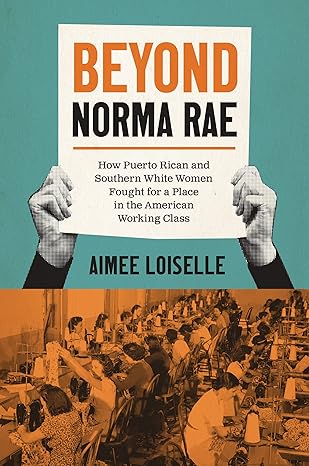The Book
Beyond Norma Rae: How Puerto Rican and Southern White Women Fought for a Place in the American Working Class
The Author(s)
Aimee Loiselle

Aimee Loiselle’s Beyond Norma Rae: How Puerto Rican and Southern White Women Fought for a Place in the American Working Class presents a compelling history of the intersection of colonialism, sexism, and capitalism. The book focuses primarily on two textile union icons, Crystal Lee Sutton and Gloria Maldonado, to analyze how hegemonic discourses have appropriated (or not) their labor struggles.
The book’s opening chapters focus on the history of textile workers in Puerto Rico and their subsequent migration/recruitment to northeast mills, particularly in New York. Loiselle aptly discusses the rhetorical transformation of these women from exploited labor to “dependent” migrants throughout the twentieth century. Although there are many previous studies about the needlework industry in Puerto Rico and its relationship to U.S. colonialism, Loiselle offers a fresh look into the history of the unionization of this sector and its representation in cultural products and discourses, such as in the “Nosotras Trabajamos en la Costura” public history series.
Even though the book offers an enthralling analysis of the unionization of Puerto Rican needleworkers, its greatest strength is its analysis of Hollywood’s cultural appropriation of Crystal Lee Sutton’s story. As a committed textile labor organizer, alongside her fellow workers, Cristal Lee fought for the unionization of mills in the U.S. South. While, as Loiselle argues, Sutton believed in the power of the collective and fought to foreground the importance of the group over the self, Hollywood successfully transformed her into an iconic figure of self-reliance and individual struggle. Loiselle convincingly argues that the disjunction between Sutton’s image of herself and her work, and Hollywood’s representation of her, in the Academy-Award-winning film Norma Rae, foreground the power of neoliberal discourses to appropriate labor struggles as acts of rebellion rather than as community building. As the book narrates, though Sutton consistently fought to foreground the collective and have control of her story, ultimately the discursive power of Hollywood worked to not only hide its exploitative use of Sutton’s story but also to sell itself as a champion of the same “little guy” it was exploiting. In the end, Hollywood’s version of Sutton prevailed over the actual woman.
Overall, Beyond Norma Rae weaves together labor, cultural, and social history into a thorough analysis of the power of rhetoric. Although the book falters in its concluding discussion of Gloria Maldonado and the unionization of Puerto Rican needleworkers, particularly regarding its analysis of race and colonialism, it is nonetheless a great addition to the scholarship on not only labor, but also gender, media, and film studies. Loiselle manages to construct a history that is both detailed and well-documented, and also easy to read.
About the Reviewer
Naida García-Crespo is an independent researcher with a PhD in English from the University of Illinois in Urbana Champaign. Her work has appeared in Film History, Early Popular Visual Culture, and CENTRO Journal, among other journals. She is the author of Early Puerto Rican Cinema and Nation Building (1897-1940): National Sentiments, Transnational Realities (Bucknell University Press, 2019).

0